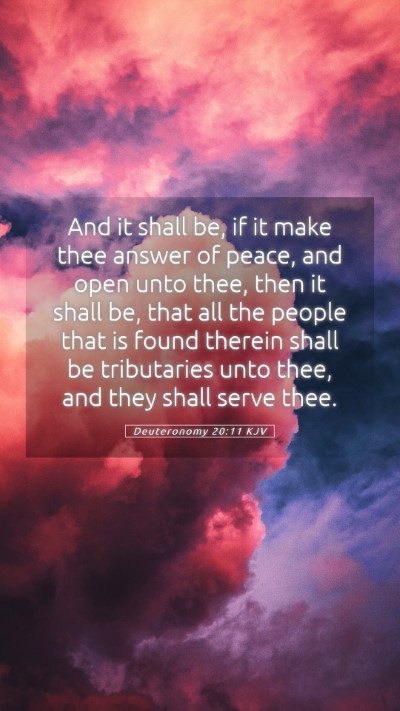Understanding Deuteronomy 20:11
Deuteronomy 20:11 states: "And it shall be, if it make thee answer of peace, and open unto thee, then it shall be, that all the people that is found therein shall be tributaries unto thee, and they shall serve thee." This verse is part of a larger context concerning the instructions God gave to the Israelites as they prepared to enter the Promised Land. The verse provides crucial insight into military engagements during their conquest and illustrates principles of mercy and peace in warfare.
Bible Verse Meaning and Context
The meaning of Bible verses often requires exploring the historical context in which they were written. In Deuteronomy 20, Moses outlines laws for Israelite warfare, explaining how they are to approach cities that lie in their path.
Key Themes in Deuteronomy 20:11
- Peace and Diplomacy: The scripture emphasizes the importance of seeking peace before resorting to conflict.
- Tributary Servitude: If a city responds positively, it was not to be destroyed but rather subjugated in peace.
- Divine Will: The verse underscores that the fate of cities is under divine guidance, as Israelites are instructed to follow God’s lead.
Bible Verse Interpretations by Commentators
Commentary from notable theologians provides further depth to this verse.
-
Matthew Henry's Commentary:
Henry emphasizes the divine mandate for peace and the significance of mercy in warfare. He notes that these instructions reflect God's desire for His people to pursue peaceful resolutions whenever possible.
-
Albert Barnes' Notes:
Barnes elaborates on the conditions under which Israelite forces were allowed to engage in war. His commentary stresses that this approach showed Israel’s strength and righteousness, as they were to extend a chance for peace before actions of war.
-
Adam Clarke's Commentary:
Clarke provides insight into the cultural implications of the verse, explaining that the offer of peace was a strategic approach that could yield better outcomes for Israel as they entered foreign territories.
Application of Deuteronomy 20:11
The principles found in this verse convey important lessons that can be applied to daily life:
- Seek Peace: In our interpersonal conflicts, we should strive for peaceful resolutions before escalating situations.
- Respect for Others: The outlook in this passage encourages respect for those outside our community.
- Trust in God's Guidance: Just as God guided the Israelites, individuals today should seek divine guidance when faced with challenges.
Cross References
Deuteronomy 20:11 relates to several other scriptures that enhance its meaning:
- Proverbs 16:7: "When a man's ways please the LORD, he maketh even his enemies to be at peace with him."
- Isaiah 26:2: "Open ye the gates, that the righteous nation which keepeth the truth may enter in."
- Matthew 5:9: "Blessed are the peacemakers: for they shall be called the children of God."
Conclusion
Deuteronomy 20:11 serves as a powerful reminder of the value of peace, both in ancient Israelite culture and today. It emphasizes that the pursuit of peace not only aligns with divine commandments but also leads to better outcomes in human relationships. Understanding scripture in this context helps in our personal Bible study, enriching our understanding of God's character and His desire for humanity.
Further Resources for Bible Study
For those interested in deepening their Bible verse understanding, consider exploring various Bible study resources and materials, such as:
- Bible Study Guides: Structured guides can help navigate complex verses.
- Online Bible Study Platforms: Engage with study groups or forums focused on discussing specific passages.
- Bible Commentary Books: Invest in comprehensive commentaries for in-depth analysis.
Final Thoughts
In-depth Bible verse analysis not only enriches our scriptural knowledge but also equips us to apply these teachings in our lives. Deuteronomy 20:11 stands as an excellent example of how scripture guides us towards righteousness through peace, mercy, and divine trust.


